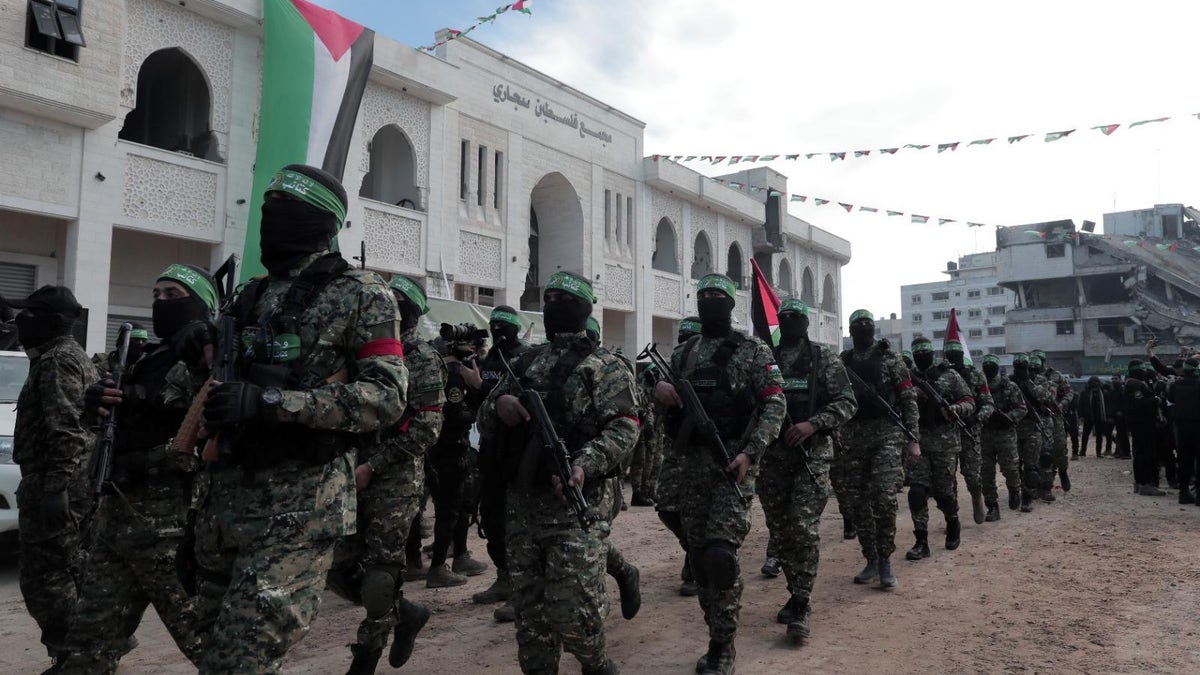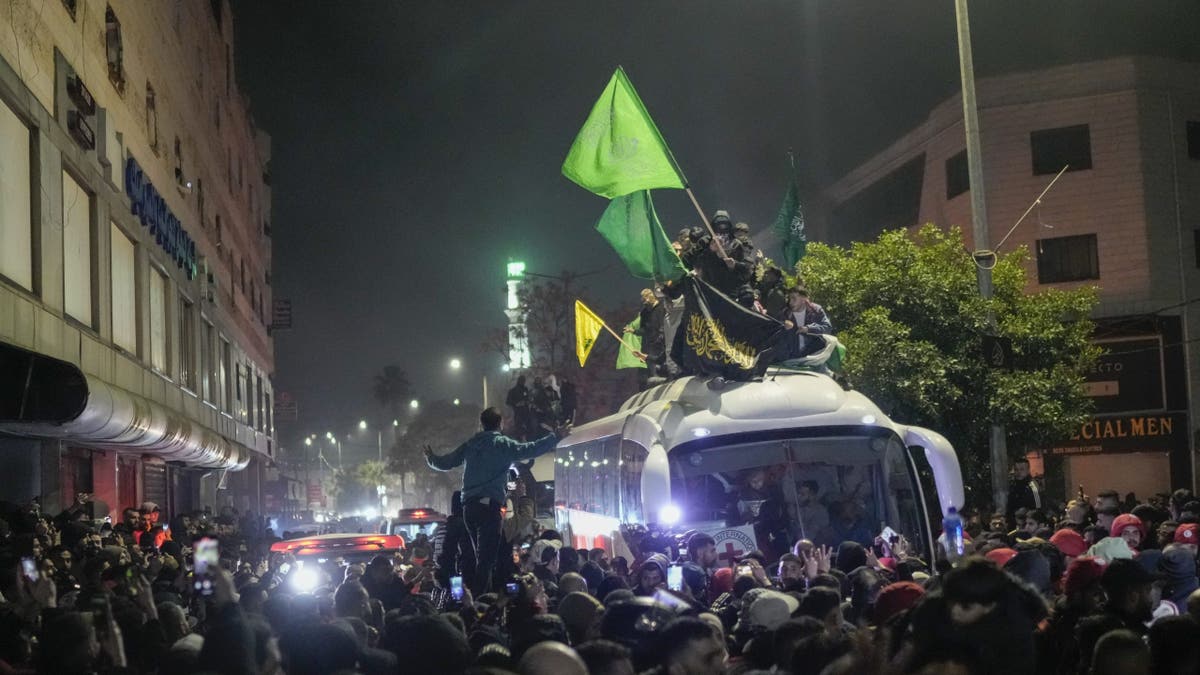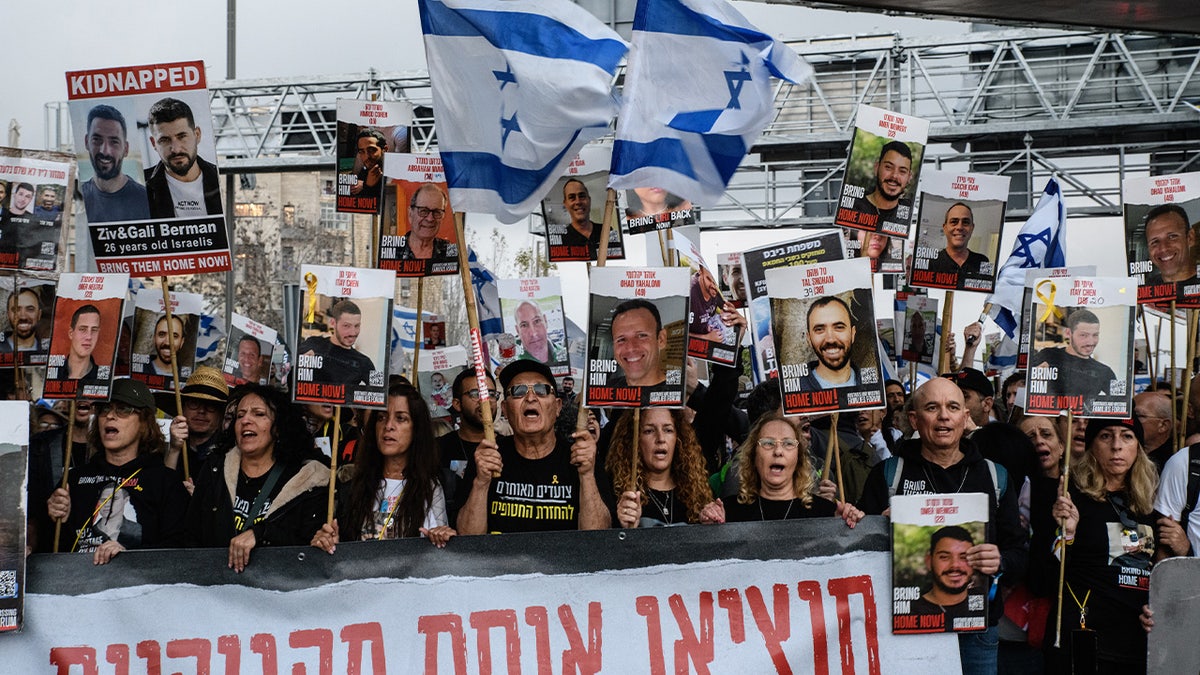Israeli victims of terror concerned murderers released from prison, relieved 7 hostages back home

As part of the second stage of the high-stakes ceasefire deal between Israel and Hamas, four female hostages who had been held by the terror group in Gaza for 477 days — Karina Ariev, Daniella Gilboa, Naama Levy and Liri Albag — were reunited with their families Saturday.
In exchange, Israel released 121 Palestinian prisoners sentenced to life imprisonment for deadly terror attacks and an additional 79 prisoners serving lengthy sentences.
The release of Palestinian prisoners — some convicted of heinous terrorist acts — has stirred profound emotions and debate across Israel. While the deal has helped the return of hostages held in Gaza, it comes at a heavy cost.
Families of victims of the released prisoners have expressed anguish, grappling with the pain of reopening old wounds while recognizing the importance of reuniting hostages with their loved ones.
HAMAS RELEASES 4 FEMALE HOSTAGES AS PART OF ISRAEL CEASEFIRE
Hillel Fuld, whose brother Ari was killed six years ago by a Palestinian terrorist, shared the personal toll of hearing the perpetrator might be freed.
“It’s a punch to the gut, for sure, but I don’t think our personal loss changes our opinion on this deal,” Fuld said. “It’s both terrible and beautiful — terrible strategically, but beautiful because the hostages’ families get to reunite with their loved ones.”
Buses carrying Palestinian security prisoners are greeted by a crowd after they were released from an Israeli prison after a ceasefire agreement with Israel in the West Bank city of Ramallah, Saturday, Jan. 25, 2025. (AP Photo/Nasser Nasser)
Fuld also highlighted security concerns.
“My understanding is that the terrorist who murdered my brother will be deported outside of Israel, to Turkey or Qatar,” Fuld said. “I’m not overly worried about that, but those returning to Judea and Samaria are definitely a security concern. I hope the government has a plan for what comes next.”
Orit Mark Etinger lost her father, Michael Mark, in a 2016 terrorist attack. Her younger brother, Fedya, who survived the attack that killed their father, was killed in Gaza. Two of her cousins were also victims of terror attacks.
“When I first heard about the decision to release terrorist prisoners in exchange for hostages, I felt deep pain and anguish,” Etinger told Fox New Digital, “Releasing murderers who destroyed entire lives is unbearable. No one can bring my father back. Meanwhile, the terrorist who murdered him may now walk freely on the street.
“One of my father’s murderers had already been released in the Shalit deal and returned to kill. We understand who we’re dealing with, which is why we fear the repercussions of releasing murderers with blood on their hands. But we cannot leave the hostages — innocent people — living in hell in Gaza. They must come home.”
Two of the prisoners released Saturday were involved in the terrorist attack that killed her father.

Hamas terrorists parade in Gaza before the transfer and release of four Israeli female hostages Jan. 25, 2025. (TPS-IL)
Among the 1,900 prisoners to be released in the ceasefire agreement are individuals responsible for some of the deadliest attacks in Israeli history. Wael Qassem is serving 35 life sentences for orchestrating suicide bombings that killed 35 people. Majdi Za’atri, sentenced to 23 life terms, drove a suicide bomber to a Jerusalem bus stop in 2003, killing 23, including children.
Another terrorist released on Saturday, according to the Israelis, was Mardawi Tabat, who “was serving 21 life sentences for murdering 21 civilians and injuring 150 others in five suicide bombings and shooting attacks,” according to a post on X.
Other high-profile prisoners include Ammar Al-Ziben, serving 32 life sentences for planning multiple suicide bombings, including the double bombing at the Mahane Yehuda Market in 1997 that killed 16. Ahmad Salah, serving 21 life sentences, was involved in two Jerusalem suicide bus bombings in 2004 that killed 19 people and injured over 100.
Israeli General Security Service Director Ronen Bar warned that 82% of the 1,024 prisoners released in the 2011 Gilad Shalit exchange returned to terrorism.
“Many of the leaders of Hamas who orchestrated the Oct. 7 massacre were among those released in previous deals,” Bar told the security cabinet, while still recommending going ahead with the deal.
BITTERSWEET REJOICING AS FIRST HOSTAGES RETURN TO ISRAEL AFTER 471 DAYS IN CAPTIVITY

A bus carrying released Palestinian security prisoners arrives in the West Bank city of Beitunia as part of the ceasefire deal with Israel. As part of the deal, the Netanyahu government agreed to release a large number of convicted terrorists Jan. 20, 2025. (AP Photo/Leo Correa)
Zohar Dvir, former commander of the elite Yamam counterterrorism unit, told Fox News Digital, “Arresting such a terrorist requires immense investment in intelligence, planning, creativity and a high level of risk for our forces, who often pay a heavy price. However, when it comes to the lives of many hostages, we are compelled to pay a heavy price by releasing terrorists.
“The chances of rescuing them alive diminish dramatically from one operation to the next, as time passes. The way to release hostages alive is through a deal. Talking from experience, the security establishment has a long memory and will settle accounts with everyone sooner or later, wherever they may be.”
Israeli journalist Yair Cherki, whose brother was killed in a terrorist attack in Jerusalem, weighed in on the deal’s implications.
“Israel succumbed to humanitarian pressure at the most critical moment, providing aid that effectively reinforced Hamas’s civilian control in Gaza,” Cherki said. “Diplomatically, the strategy relied entirely on waiting for Trump, which proved to be a dead end. Like Biden’s “don’t,” Trump’s gates of hell also worked both ways, leaving Israel without any diplomatic leverage.

Israeli hostage families carry the photos of their loved ones held hostage by Hamas in Gaza as they march to Jerusalem. (Matan Golan/SOPA Images/LightRocket via Getty Images)
“After 15 months, the time for the hostages has run out, and Israel is left with no choice but to accept the deal to bring the hostages home and begin healing a fractured society. Releasing these terrorists is not just a problem for the victims’ families, but for all Israeli society and future victims.
“This cycle of deals leading to murder and kidnapping must end. Releasing the hostages reflects our society’s commitment to life and mutual responsibility. This is our DNA.”
Even those directly affected, like Fuld and Etinger, acknowledge the hostages must be prioritized.
“Most families support the deal because they would do anything to bring their loved ones back,” Etinger noted. “But we fear these released terrorists will harm others.”
CLICK HERE TO GET THE FOX NEWS APP
Cherki underscored the collective responsibility of Israeli society.
“This deal is not just about individual families,” Cherki said. “It’s about a society’s commitment to life and solidarity. Despite its flaws, this deal may serve as a key to healing a broken nation.”





